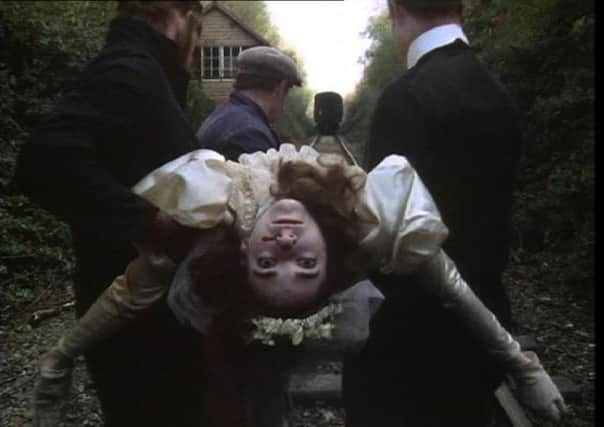The man who brought an eerie touch to yuletide TV


BRITAIN does eerie very well.
Eerie tales, eerie films, eerie television. And when someone creating that eerie mood has a palpable sympathy with the concept, then some genuinely timeless work is arrived at.
A glance at the Christmas TV schedule leads the inquiring viewer to The Tractate Middoth, a half-hour rendition by Mark Gatiss of a classic tale of the supernatural by that revered figure, M R James.
Advertisement
Hide AdAdvertisement
Hide AdGatiss is everywhere at the moment. A writer, actor and now director – making his debut with the James story – he wallows gloriously in the reading matter of his youth to give modern audiences everything from Sherlock to Doctor Who.
And in The Tractate Middoth he has, seemingly single-handedly, revived a tradition that was begun by the BBC in 1971: the ghost story for Christmas.
Back then it was Lawrence Gordon Clark who had the inspired notion of pitching a Yuletide ghost story to the controller of BBC1. The idea was promptly commissioned and Clark delivered M R James’ The Stalls of Barchester on a meagre £9,000 budget following an 11-day shoot.
Over the next six years Clark’s films – including four more by James, one from Dickens and another new contemporary piece – became a fixture in the Beeb’s festive line-up. If Morecambe and Wise had a Christmas show, so did Lawrence Gordon Clark. And when he left the BBC to join Yorkshire Television in 1978 he took the ghost story tradition with him, filming Casting the Runes against the urban backdrop of a snowy Leeds in early 1979.
Advertisement
Hide AdAdvertisement
Hide AdNow those stories, along with Clark’s memories of adapting them for television, have been collected in a new anthology by indie publishing house Spectral Press.
The volume entitled The Christmas Ghost Stories of Lawrence Gordon Clark, focuses on Clark’s versions of James’ tales and represents a literary time capsule underpinning a golden age of TV.
Clark’s compatibility with his subject is evident in his enduring films. What’s more, he clearly influenced Gatiss who, in his foreword to the anthology, acknowledges the debt he and others of his ilk owe to Clark and his particular style. “Lawrence achieved a rare kind of poetry with these beautiful short films,” writes Gatiss. “Quintessentially Jamesian though they are, these are Lawrence Gordon Clark’s visions. Quite simply, he knew how to do M R James right.”
Clark’s appreciation of the mood of James – he refers to him as “a small-room writer” and observes, “you expand at your peril” when adapting him for television – is evident in his approach. He made the stories to the length they fitted, never padding where it wasn’t required.
Advertisement
Hide AdAdvertisement
Hide AdGatiss has adopted an identical strategy with The Tractate Middoth. The story runs to its natural end. It might be Gatiss and the BBC in 2013 but the influence of Clark and his 1970s aesthetic is omnipresent.
Recalling those far-off days Clark says he always saw his films as personal versions of James’ stories – crowd-pleasers rather than aimed at purists.
“A movie is different from dialogue just as theatre and films are different from literature,” he said in an interview conducted at Halifax Ghost Story Festival last year and which is reproduced in the book.
“Actually that’s why some of the worst books make the greatest films.
Advertisement
Hide AdAdvertisement
Hide Ad“It’s a funny thing: even with some of the best books people struggle and struggle and can never quite achieve it on screen.”
He has an answer: “It’s because literature can do things that film cannot.”
A director’s life in television
The ghost stories Lawrence Gordon Clark made during his time included:
The Stalls of Barchester, 1971.
A Warning to the Curious, 1972.
Lost Hearts, 1973.
Treasure of Abbot Thomas, 1974.
The Ash Tree, 1975.
The Signalman, 1976.
Stigma, 1977.
He also directed the James adaptation of Casting the Runes in 1979.
Advertisement
Hide AdAdvertisement
Hide AdAfter his time with the ghost stories, he went on to direct episodes of Flambards, starring Christine McKenna and later went on to work as a director for hire on shows including Casualty and Dangerfield.
The Christmas Ghost Stories of Lawrence Gordon Clark is edited by Tony Earnshaw and published by Spectral Press.
www.spectralpress.wordpress.com